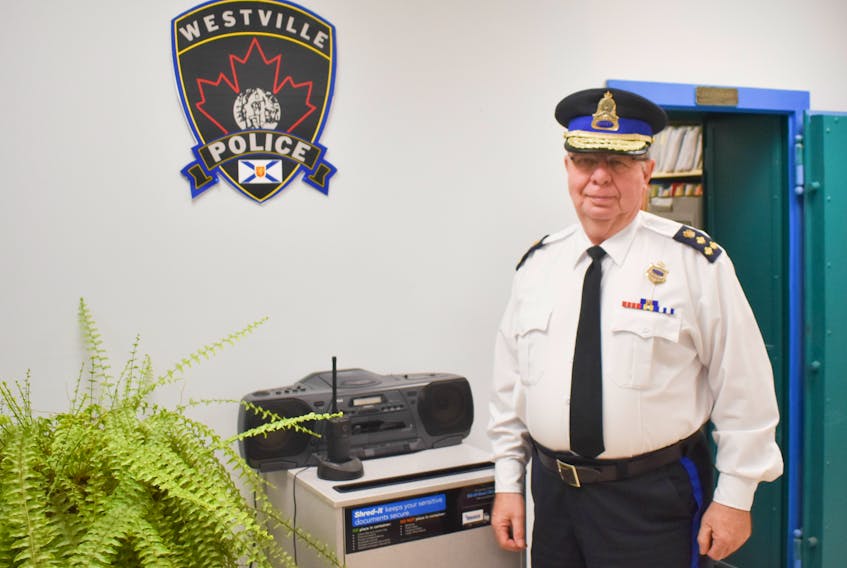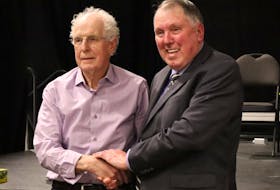WESTVILLE, N.S. — Things were different in 1976, the year Don Hussher started working as a rookie police officer in Trenton.
The town had recently started its police force and there were problems that had to be addressed. Shoplifting and vandalism were rampant and many teens in the town were out of control. While police officers had to deal with the problems, they also were concerned by lengthy records youth were accumulating. In a time before the Youth Justice Act and restorative justice, the crimes would have a lasting impact if formal charges were laid.
"They were ruining their lives," Hussher said.
After talking to youth and working with fellow police officer Dan Walsh, they came up with a possible solution; they would form a club for youth and police to interact on a more positive level. It offered young people something to do and helped keep them out of trouble.
"It really turned the youth around," he said. "They started to have respect for the police and, working with the police. They got involved with hockey. They got involved with community events. They basically started to develop a rapport and a good relationship."
As Hussher retires this month from his position as police chief of the Town of Westville, he reflects on this as a positive change that he was able to be part of. It’s something he still hears good things about and how it's made a lasting impact.
When Hussher moved from Trenton to the Westville police department in 1990 to become chief, he started a similar program with youth there. And when, for a time, the Westville police department was absorbed into the New Glasgow Police Department, he took it there as well.
In 1990, Hussher also saw the start of the Westville Citizens Crime Prevention Association. This partnership with the community was one he would greatly value during his time in policing.
"The association had a tremendous impact on battling crime and the association assisted the police services in many ways that enhanced policing."
The group helped reestablishing Westville's Police Service in 2002 and funded interview rooms so victims of crime could have a relaxed atmosphere to speak to police in.
"These are only a few areas that these dedicated citizens improved the quality of life for everyone."
Another particular area Hussher had a hand in over the years was developing and evolving the way local police departments manage files.
"I took it upon myself at a very early stage to look at the file management and develop a case management system for overseeing calls and files that came in within the department," he said.
He took that file management system to Westville as chief. Around the same time the province did a series of audits and recommended police departments automate their files using computers.
At the time, few departments had such computerized systems and the cost was high, particularly for small municipal police departments. So Hussher reached out to the Nova Scotia Community College campus located in Stellarton. Working with staff and students there, they were able to develop a DOS-based case management system. That system would become the go-to solution for small police departments in the province looking to modernize properly on a budget and earned the nickname of "The Westville Solution."
"That was a feather in the hat for the community college and the employees and staff here that worked on it."
Many changes
Hussher said it's hard to believe how much policing has changed since he started. When he began, an officer carried a notebook, sidearm and a radio.
"It is a highly technical field now," he said.
The technology in some ways has improved the tools that police use, but at the same time has changed the nature of crime itself.
Today, cyber-crimes and fraud are something that people wouldn't have imagined in the 1970s.
"When I was a policeman in the '70s if someone was defrauding somebody it was done at the front door," he said. But today, he said when police trace down where a call came from it might take them all over the world.
The laws have also changed. Firearms legislation began in the 1970s. Then there was the Canadian Charter of Rights and Freedoms that came into effect in 1982.
Disclosure was another big game changer in the legal system. At one time prosecutors were able to keep some information to themselves such as rebuttal witnesses they might have or other evidence, but laws around disclosure took away any surprises an accused might face in court.
"Now, basically a case is tried before it even gets into court," Hussher said.
Changes to how youth are dealt with by the law have been another positive change Hussher has seen. He saw the Juvenile Delinquents Act replaced by the Young Offenders Act and then the Youth Criminal Justice Act.
A change that has not been a surprise for the veteran police officer is the legalization of marijuana.
"In actual fact, we lost the fight with marijuana back in the ‘60s," he said.
Something that he's come to learn as a police officer is that when you see a high degree of noncompliance, it shows a problem with the law.
Even in the 1960s and 1970s he said people of all walks of life were using marijuana. Gradually, over the years, the fines became less and less.
"All they did before is just drive it underground."
Through all these changes, Hussher believes an important part of policing is still getting out into the community and interacting people, just like he did in those early days in Trenton and continued to do in his roles in Westville, Stellarton and New Glasgow.
While he will likely still be active in the community, he says he is ready to retire.
“It's time to pass the torch. When it comes time, you know.”
Things will be different without him.









